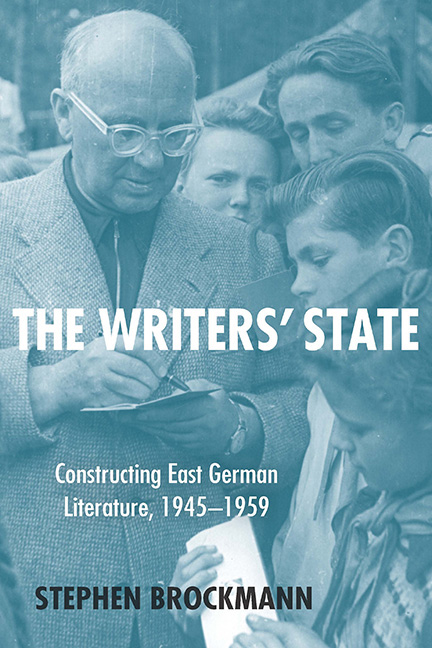Book contents
- Frontmatter
- Dedication
- Contents
- Acknowledgments
- Introduction: Reconstructing East German Literature
- Part I The Absence of State (1945)
- Part II Constructing the State (1949)
- Part III Contesting the State (1953)
- 5 Typical Heroes, 1951–53
- 6 The Danger of Optimism, 1953
- Part IV The State Cracks Down (1956)
- Conclusion
- Selected Bibliography
- Index
5 - Typical Heroes, 1951–53
from Part III - Contesting the State (1953)
Published online by Cambridge University Press: 05 February 2016
- Frontmatter
- Dedication
- Contents
- Acknowledgments
- Introduction: Reconstructing East German Literature
- Part I The Absence of State (1945)
- Part II Constructing the State (1949)
- Part III Contesting the State (1953)
- 5 Typical Heroes, 1951–53
- 6 The Danger of Optimism, 1953
- Part IV The State Cracks Down (1956)
- Conclusion
- Selected Bibliography
- Index
Summary
Andrea loudly: Unhappy the land that has no heroes!
…
Galileo: No. Unhappy the land where heroes are needed.
—Brecht, Leben des GalileiTHE DEBATE ABOUT BRECHT's Mutter Courage in 1949 and Seghers's Die Toten bleiben jung in 1950 made it plain that the heroes of literary works were a key concern for East German critics and politicians. After all, the problem that some critics identified in Mutter Courage was that Anna Fierling, the protagonist of Brecht's play, was not really a hero at all. While Seghers's novel did feature a few positive heroes, critics such as Alexander Abusch complained that these figures tended to be less interesting than their negative counterparts and therefore failed to dominate the narratives of which they were a part.
By the end of 1952 Heinrich Goeres, writing in Sonntag, proclaimed that the relative lack of positive heroes in contemporary East German literature was one of the major problems facing the cultural sphere. In order to solve this problem, Goeres advised East German writers to follow the model of Soviet literature. Like many other literary intellectuals and SED leaders, Goeres believed that it was particularly important for his colleagues to focus their attention on heroes of the present: men and women dedicated to the construction of socialism in the postwar world.
Goeres's demand for positive heroes dovetailed with a similar call made by an editorial in the SED daily Neues Deutschland on 9 November 1952. The unsigned editorial castigated East German writers for lagging behind the objective development of their country and charged that their tardiness was the result of ideological unclarity. Neues Deutschland insisted that the struggle between socialism and capitalism, between east and west, and between progress and reaction was worthy of depiction in dramas and novels. Nevertheless, East German writers had as yet produced relatively few literary works that reflected the revolutionary changes occurring in the country. “Is not all of this a genuine national epic in the truest sense of the word? Why is it that our writers are not throwing themselves into … this reality artistically with the same passion and the same optimism as our working people and our party …?” The placement of this editorial in the first column of page 1 of the SED “organ” gave these demands particular prominence.
- Type
- Chapter
- Information
- The Writers' StateConstructing East German Literature, 1945-1959, pp. 171 - 201Publisher: Boydell & BrewerPrint publication year: 2015



